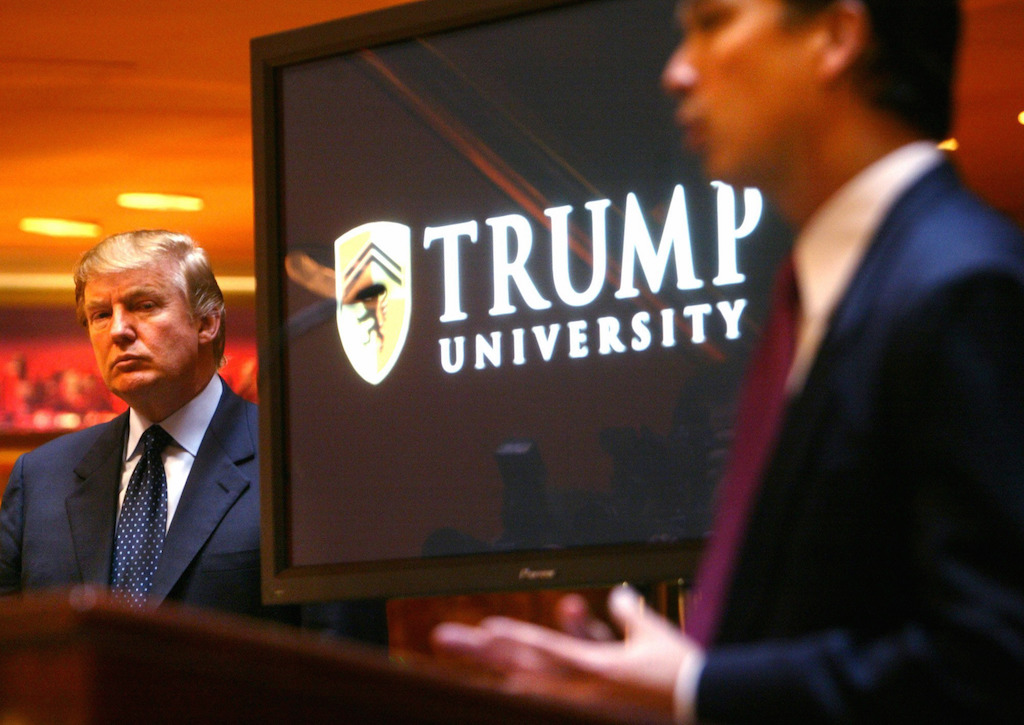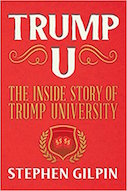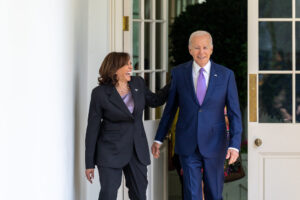Screw U: The Illegal Business Practices of Trump University
Soon after the author of "Trump U" started working for Donald Trump, he realized he was part of an appalling con game. Donald Trump listens as Michael Sexton introduces him to announce the establishment of Trump University at a 2005 news conference in New York. Sexton was president and co-founder of the business education company. (Bebeto Matthews / AP)
Donald Trump listens as Michael Sexton introduces him to announce the establishment of Trump University at a 2005 news conference in New York. Sexton was president and co-founder of the business education company. (Bebeto Matthews / AP)
Editor’s note: Stephen Gilpin, the author of “Trump U: The Inside Story of Trump University” (O/R Books, 2018), is not a professional journalist or political commentator. In fact, he started out as someone who, in his own words, “idolized” Donald Trump. But not long after working for Trump at Trump University, Gilpin realized he was part of an appalling con game. In the following excerpt from Chapter 16, Gilpin details the shady business practices of the company.

Purchase in the Truthdig Bazaar
One day, I was on a podcast taking place in the Trump University offices on the thirty-second floor of 40 Wall Street. Donald Trump was participating from another office. We were talking about the real estate market, and whether it was a fire sale right now. I was panicking a little about my job, looking at the market. Trump said, “Steve, first off look where you’re at, and look who you’re with. If the real estate market is a fire sale, I’m sitting right next to you, who do you think they’re getting first?” Coincidentally, the building actually caught on fire that day. So we had to stop the podcast and get out of the building by climbing down thirty-two flights of stairs.
At the time, Sexton was interviewing people who wrote courses on tax deeds, tax sales, and tax liens. He had noted the success of a couple of real estate gurus who were touring and speaking on tax liens, and he wanted a tax lien program for Trump University.
He had me interview one applicant, a man named George, who was supposed to be an expert on tax liens. He was already touring and teaching courses. I interviewed George for a couple of hours and thought, “Holy shit, if we hire this man, we’re all going to jail.”
I told Sexton not to even think about doing business with him. But Sexton was reluctant to let go of someone who could potentially bring in sales. He asked me whether I would give him a trial run, joining him to do a show on tax liens and tax deeds.
“Hell, no!” I said.
I thought that Sexton took my advice and rejected him. But apparently he was already doing Trump University seminars. On August 8, 2008, someone named Mlmguru posted a complaint against Trump University on the Ripoff Report website. This person wrote, “The presenter guy, George, says he was mentored by ‘rich uncle’ and conveniently his first profit deal was for $50,000. The guy’s a New York real estate broker, foreclosure vulture, and most disgustingly, he admitted to being a professional auctioneer and said lots of people get suckered into buying worthless property at auction, and when they can’t pay the down payment they get to keep the money.”
Trump University also flew me around the country to run field mentorship programs. My bus tours became wildly successful. I treated these three-day sessions like boot camps. I liked to say that if you’re going to spend all this money, then you’d better be ready to hit the road at eight in the morning and see twenty-five properties every day. I told people that I didn’t care if we had to work until two in the morning. You will get your money’s worth. You will be
educated.
We would go all day and night, until the students begged me to stop. Students were pleased. I asked one woman who had a lot of energy why she chose me for her field mentorship. She replied, “Because I heard that you’re the drill sergeant in real estate. You know what you’re doing, but I’d better be prepared to hit the ground running.”
One day, after being on the road for several hours looking at houses, she asked, “Are we going to stop to eat?”
“Well, no, not really,” I replied. “We’ve got properties to do. I told you to pack a snack bag.”
She said, “Oh, I’ve got one! I’ve been eating almonds all morning. I’ve been eating. I was just waiting for you to start eating. I’m just worried about you passing out on me.”
I wasn’t stopping to eat. I would just go on coffee and oatmeal cookies all day. Later, she said, “Could you do me a favor? I’m a little older than you, and I need more frequent bathroom stops. Can we stop?”
“Of course we’ll stop, but you’ve got to tell me when,” I replied. “We have so many properties to see that it’s going to take time out of our day.”
“You know what?” she said. “Just pull over here at the pharmacy. Wait for me here. Have a coffee and a cigarette. I’ll be right out.” For the rest of the day, and it was a very long day, she didn’t ask to stop at all. She didn’t need any more bathroom breaks.
We met later and she gave me rave reviews. She made a lot of money in real estate and she still practices today. She approached me and thanked me for inspiring her and taking her out on that field mentorship.
Then she said, “I’ve got to tell you a secret.”
“What’s that?” I asked.
“Remember how I didn’t have to go to the bathroom anymore that day? I went into the pharmacy and bought adult diapers. I didn’t want to stop the deal flow. I was so excited to make money. And every time that you stopped for coffee, I changed the diaper.” I laughed so hard that I almost fell on the ground. I couldn’t believe it. I’m so proud of the students of mine who have been successful.
My field mentorships were so well received that word trickled up the grapevine to Donald Trump himself, and for the very first time, he reached out to me. Donald Trump’s secretary called and told me that Mr. Trump would like to send me an autographed photograph. She asked for my address. When I received the photo, it was bordered in gold and said, “Awesome job, Steve. Congratulations. Keep up the excellent work.”
Being a meek person who was not used to praise, I was thrilled. In hindsight, it was odd that Donald Trump wouldn’t have called me personally, and that his secretary would have to ask for my address, since I worked in his office building and he cut my checks. And it speaks volumes about the Trump Organization that the reward for an overperforming employee was a mere signed photograph. I wonder whether he even signed it personally, or if the autopen did it.
Despite my pride in helping thousands of students, many of whom I am still in contact with today, I was only able to impact a fraction of the hundreds of thousands of students who came through Trump University. While some flourished and became millionaires, others I could tell right away didn’t have the concentration or focus to be a success. For example, they couldn’t handle the mathematical calculations, or they’d have so much anxiety that they couldn’t follow through on a purchase that was a good deal. My heart went out to such people and I refused to just take their money. Instead I advised them to get a refund and discontinue personal coaching. Some people had been sold on a dream. When you pay $34,995 for special coaching, it’s such an extravagant amount that the only way to justify it to yourself is to believe that you’ll get a substantial return on your investment. Students could be very self-delusional about this.
Donald Trump did’t get rich on his own. He was born wealthy, and he was groomed for success. He said he got started with a “small” loan of one million dollars from his father, and insisted that was the whole story. But the Wall Street Journal tracked down a 1985 casino-license disclosure that showed Trump’s father lent him $14 million—$31 million in today’s dollars. And in 1991, New Jersey regulators came after Trump after his father bailed out his failing Trump Castle Casino by buying $3.5 million in chips and never playing them. Trump Castle got to keep the money, but under terms of the settlement, the casino was forced to pay a fine of thirty thousand dollars. Now that was a sweet deal—receive a gift of $3.5 million, for which you must pay a fee of just thirty thousand dollars! By purchasing chips like a regular customer instead of simply giving his son three and a half million bucks, Fred Trump also saved big on the federal gift tax. If my students had that kind of banker sitting at their elbow, they all could have gotten rich in real estate.
Human psychology being what it is, given the choice between accepting that they had been duped into wasting their money, or believing that they could be the next Donald Trump, most students obviously preferred the latter option. So it took quite a bit of work sometimes to get students who were doomed to fail in real estate to admit defeat and move on.
As for the Trump University leadership, my feeling at the time wasn’t so much that Michael Sexton was blocking my attempts to fix Trump University, it was more that he had given up. With the ship going down, instead of fixing it, he was just biding his time so that he could step into the lifeboat and row to shore.
I still believe, absolutely, that Trump University could have been fixed. We could have told Trump—who owned roughly ninety-three percent of the school—“We paid off your investment plus millions in profit. You made a lot of money. Now let us reorganize, restructure our business model, get rid of the bad mentors, give out a lot of refunds, and upgrade what we teach.” We would have needed another infusion of cash from Donald Trump, but it could have been done.
We could have gone legit. But I was slowly figuring out that I was the only person who wanted to go legit and who was driven by the passion to educate students for real.
Meanwhile, the Trump University ship continued to sink. First, we stopped teaching seminars in Texas, and then in Delaware. In 2010, Greg Abbott, the attorney general of Texas, launched an investigation after the school racked up thirty complaints over two years. We pulled out of the state before the probe was completed. A few years later, Trump made two contributions to Abbott’s gubernatorial campaign—one for twenty-five thousand dollars in July 2013 and the other for ten thousand dollars in May 2014. It was Trump’s only substantial venture into Texas politics. The governor’s critics in the state Democratic Party said that Abbott was “on the corrupt Trump payroll.” A former deputy chief of Abbott’s consumer protection division, John Owens, claimed that his bosses torpedoed their request to sue Trump University for illegal business practices.
A memo dated May 11, 2010, and provided to the Texas Tribune and other news organizations, revealed that Owens and his colleagues wanted to ask Trump University for a $5.4 million settlement.
In 2016, Owens charged that Republican Texas Attorney General Ken Paxton issued a cease and desist letter to him after he made public copies of a fourteen-page internal summary of the state’s case against Donald Trump, accusing him of scamming millions from students of Trump University. Owens, now retired, said his team had built a solid case against Donald Trump and Trump University, but was told to drop it after the school agreed to cease operations in Texas. The former state regulator told the Associated Press that the decision was “highly unusual,” leaving the bilked students on their own to attempt to recover their tuition money from the school.
“It was swept under the rug, and the consumers were left with no one to go to bat for them,” Owens told the Texas Tribune. No one has yet uncovered a smoking gun, but many people think that thirty-five thousand dollars in campaign contributions was a mighty low price for Trump to pay, letting him cut his losses and avoid tangling with Texas lawmen.
Delaware and many other US states have laws that protect distressed homeowners, which say that if you offer a lowball cash deal to convince them to sign over their deed to you, you will go to jail. It’s considered predatory, because someone who has no money for food can get taken advantage of very easily by a “rescuer” who steps in with a cash offer that is unethically below the value of the property they want to buy. You’ll find horror stories in the news about older people or impoverished people who have had their property essentially stolen from them. And yet Trump University mentors were teaching “cash-for-keys” transactions for quick turnaround sales in states like Delaware where it was banned.
It was completely unethical, and I was horrified. In fact, some of the mentors had to eventually change their names so that they could continue teaching real estate.
Your support matters…Independent journalism is under threat and overshadowed by heavily funded mainstream media.
You can help level the playing field. Become a member.
Your tax-deductible contribution keeps us digging beneath the headlines to give you thought-provoking, investigative reporting and analysis that unearths what's really happening- without compromise.
Give today to support our courageous, independent journalists.






You need to be a supporter to comment.
There are currently no responses to this article.
Be the first to respond.